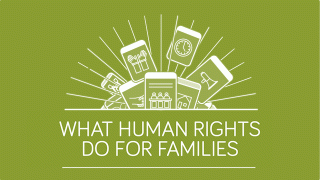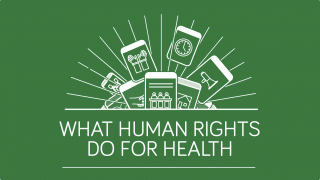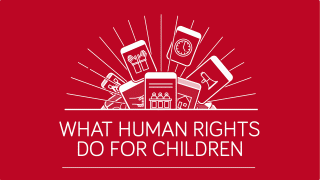What Human Rights do for those seeking refuge
Use the filters below to show cases from specific categories
Gay and lesbian people can’t be returned to persecution
Related European Convention Articles
Under the United Nations Refugee Convention, social groups that have a well-founded fear of persecution are refugees. In this case, the Supreme Court said gays and lesbians could not be expected to live closeted lives in places they are persecuted.
Unreasonable delays in prolonging detention are unacceptable
Related European Convention Articles
The court states that detention or arrest of a person is only lawful in cases of non-compliance with the lawful order of a court, or in order to secure the fulfilment of any obligation prescribed by law. As the appellant fit neither of these criteria, the Court ruled that his detention had been unlawful under the terms of ECHR.
Asylum seekers have a right to accommodation whilst awaiting decisions
Related European Convention Articles
This landmark ruling found that the failure of the Home Office to provide access to support for asylum seekers waiting for a decision on their further claim for asylum for a minimum of three weeks is leading to homelessness and destitution.
FGM is recognised as torture
Related European Convention Articles
A woman from Sierra Leone was part of a social group at risk of female genital mutilation. If she returned, should was at risk of excruciating pain and death. As a result of this case, women at risk of FGM are far more likely to receive asylum.
No race barriers to asylum
Related European Convention Articles
British immigration officers at Prague airport were told to make it more difficult for Roma people to come here. The court said that racial discrimination at any point in the asylum process is not permitted, and no race of people is excluded from the right to asylum.
AIDS sufferers can’t be deported when home country treatment is inadequate
Related European Convention Articles
D argued that his expulsion to St Kitts would in effect result in the termination of the medical treatment he was receiving, which would hasten his death since no similar medical treatment was available in St Kitts.
Sending people back to armed conflict & chaotic violence isn’t OK
Related European Convention Articles
A key question in refugee cases is whether a person is at a "real risk" of inhuman treatment. In this case, Somalia was said to be a failed state meaning it was unlikely people would be sent back there.
If you face racial discrimination at home, you can seek refuge elsewhere
Related European Convention Articles
The court ruled in favour of a Bhutanese national’s claim for asylum on the grounds that his removal to Bhutan would expose him to a risk of ill-treatment due to his Nepali minority ethnicity. The court maintained that acts motivated by racial discrimination will constitute an aggravating factor.
Refugees have a right to reunite with their families
Related European Convention Articles
The European Court of Human Rights held that the UK Government’s refusal to allow the family reunion of a refugee and his wife under relevant immigration rules was unlawfully discriminatory against the refugee on the basis of his immigration status. Every person has the right to a private and family life.
No-one should endure inhuman or degrading treatment
Related European Convention Articles
The conditions faced by asylum seekers in Greece were deemed tantamount to “inhuman or degrading treatment,” and Greece and Belgium were both found to be in violation of the ECHR. The appellant’s detention and living conditions while in Greece meant that both Greece and Belgium were in violation if a deportation were to be enforced.
You can escape police persecution for your beliefs
Related European Convention Articles
A Tanzanian national faced police beatings, attacks by solders and life-threatening prison conditions due to his activity in the political opposition. He faced a real risk of harm if deported, and was prevented from being forcibly returned.
People don’t have to go back to a place that makes them suicidal
Related European Convention Articles
Inhuman treatment is unconditionally prohibited by article 3 of the ECHR, and in this case it was found that a risk of suicide upon deportation can be included within this definition. The appellants were Tamil Sri Lankans, brother and sister, who had been tortured by government security forces leading them to both suffer from depression and post-traumatic stress disorder. Their asylum claims made on a humanitarian basis were rejected, but it was found that a return to Sri Lanka could lead to a strengthening of suicidal thoughts. Preventing their deportation through the ECHR can be seen as a success in protecting the rights of asylum seekers suffering from mental illnesses.
Everyone deserves access to justice – that means legal aid where necessary
Related European Convention Articles
In this decision, the right to legal aid is discussed by the court. It is established that in some cases, in order for access to justice to be achieved, legal aid must be granted when there would be an obvious unfairness.
Unaccompanied minors claiming asylum must be properly cared for
Related European Convention Articles
The eight appellants had arrived from Afghanistan as unaccompanied minors and were at that time aged between 15 and 16. The Home Office refused their asylum claims but granted each of them Discretionary Leave until they reached 17½, but it was found that the duty to the minors goes further than this in order to protect the minor’s best interests.
Children’s views are key in deportation cases
Related European Convention Articles
The Supreme Court decided that where a parent is deported, the rights of their children must be a primary consideration An asylum-seeker mother was allowed to remain in the UK because deporting her would breach her children's rights to respect for private and family life.
Children aren’t returned to danger
Related European Convention Articles
Removal from the UK would have a negative impact on a 13-year-old's private life, as he would have been forced into a home with unsafe conditions back in Vietnam. Human rights legislation prevented this from occurring.
Asylum seekers are protected from homelesness and destitution
Related European Convention Articles
EM was an Eritrean man who experienced persecution in his home country for being a Christian, and moved to Italy, only to find himself homeless and destitute. He sought asylum in the UK, and resisted deportation. The court found if it could be established similar conditions would be present if he were deported to Italy, this would be contrary to his right not to be subjected to inhuman or degrading treatment.
Asylum seekers are offered protection from complex, evolving conflicts
Related European Convention Articles
The case illustrates the complexities of assessing what a ‘real risk’ entails, as the court had to consider the evolving political situation in Sri Lanka, taking into account many reports from government and NGO sources. In the conclusion, however, it found that forcing NA to return to his homeland, would at that time, be in violation of the right not to be subjected to inhuman or degrading treatment, and NA was protected from potential harms.
Asylum seekers have a right to preserve their mental stability
Related European Convention Articles
The ECHR gives people the right to a private and family life. In this case, it was shown that mental health can be considered a component of this right. Razgar was an Iraqi asylum seeker who was to be deported to be Germany. It was shown that the effects of deportation would be seriously harmful to his mental health. Consequently, Razgar was allowed to stay in the UK, relying on right to the preservation of his mental stability.
Oppressed and persecuted women can seek safety
Related European Convention Articles
A vital step in ensuring the rights of female asylum seekers. Two women faced the risk of criminal proceedings for sexual immorality if they were forced to return to Pakistan. The court said the women were part of a persecuted group and should be granted asylum.
Fake documents are sometimes only way to flee danger – people must still be protected
Related European Convention Articles
This case involved claims brought forward by an Algerian, an Iraqi Kurd and an Albanian, challenging their prosecutions by Crown Prosecution Services for travelling to, or attempting to travel from, the UK on false papers. The act of seeking asylum should not be criminalised.












